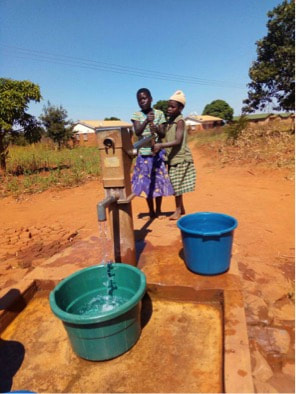Written by CorpsAfrica/Malawi Volunteer Ms. Wezi Kayira
“Literature is the gateway to the world,” my professor said. I agree with him wholeheartedly. As I read writers like Nawal El Saadawi, Buchi Emacheta, Khalid Hosseini, Mariama Ba, and many more, I appreciate how I am more sensitive to the plight of women and girls in our society.
Drawing water one day at the borehole, I witnessed a fight between a young girl and a boy. What shocked me was how the woman rebuked the girl for answering back to the boy. They asked the girl, “Why are you fighting with the boy?” and then, “Why not just leave him alone?” The girl fearlessly answered, “If he insults me, must I just watch in silence?” And then she proudly took her pail and went off leaving the rest of the women talking about her “rudeness.” I must say, this girl made me proud. Sadly, I didn’t get a chance to talk to her, but hopefully I will meet her again at the borehole soon.
According to Louis Althusser, culture is one of the ideological state apparatuses. Being this, it plays a big role in perpetuating women subjugation. As culture shapes our norms and gives each gender its distinct role, it altogether enforces gender inequality. As El Sadawi puts it in her book, The Hidden Face of Eve, “a woman, by her very nature, is unfit to shoulder the responsibilities of men.” A clear lesson derived from the many books of culture. It is therefore not surprising when we hear older women tell young girls to respect their young male counterparts simply because he will be a bread winner someday. I call this absolute madness.
So why is it surprising when we see women and girls resolve to silence? When they accept being victims of gender-based violence and opt to live with their oppressors in peace? My heart broke when one of the women in my community told me how at the age of 15 a son of a family friend raped her. The saddest part is that the son was HIV positive. In the early 2000’s, being a young girl, living in a patriarchal society, bearing in mind that society at this time labelled anyone who was HIV positive disabled and unwanted, she never told anyone what had happened and resolved to living in silence. In 2004, her greatest fear came to life when she was told she was HIV positive. Scared of her own society, she continued to live in silence until 2007 when she became critically ill and doctors advised her guardians that she get tested.
Well it’s a good thing that now she lives in peace, she’s on medication, and she’s trying to patch her life together. I asked her some of the challenges she faced after the incident and she said, “because of the critical illness I had in 2007, I had to drop out of school. It is also hard to find a serious man who wants to marry me. Lastly the silent stigma society gives limits me to enhance my capabilities.”
Now I compare the woman’s story to how the young girl acted to her oppressor. The differences are extreme. I feel sorry for the many women who went through devastating experiences and due to discrimination at that time, opted for silence as a survival mechanism. However, I smile to the power and self-assertion our young girls have today. I am delighted by how this young girl questioned the women who believed were teaching her manners. It might take a while to change, deconstruct, and abandon the dogmatic thinking culture has instilled, but I think the future looks promising.

